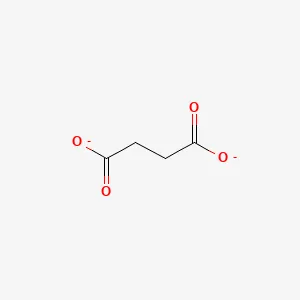
Succinate, a key intermediate in the citric acid cycle, has garnered attention in recent years for its potential benefits in fitness and health. This small molecule, produced during cellular metabolism, plays a critical role in energy production and has been identified as a significant signaling molecule that influences muscle adaptation and overall metabolic health. As research continues to unveil the various functions of succinate, its positive implications for exercise performance and recovery become increasingly evident.
One of the most compelling aspects of succinate is its role in muscle adaptation to exercise. Recent studies have shown that succinate is released by muscle cells during physical activity, particularly during high-intensity workouts. This release occurs as the muscle environment becomes slightly acidic, which facilitates the transport of succinate out of the cells. Once in circulation, succinate binds to specific receptors on other cells, triggering a cascade of biological responses that promote muscle remodeling and strengthening. This process is crucial for athletes and fitness enthusiasts looking to improve their performance and build strength over time.
The ability of succinate to enhance muscle adaptation is particularly relevant for those engaged in resistance training or endurance sports. When muscles are subjected to stress during exercise, they undergo a process known as remodeling, which allows them to grow stronger and more efficient. Succinate acts as a signaling molecule that informs the body about the need for these adaptations, effectively helping muscles respond to the demands placed upon them. This means that incorporating activities that stimulate succinate release—such as weightlifting or high-intensity interval training—can lead to improved muscle strength and endurance.
Moreover, succinate’s influence extends beyond just muscle adaptation; it also plays a role in metabolic health. Research indicates that succinate can improve insulin sensitivity, which is crucial for maintaining healthy blood sugar levels. This is particularly important for individuals who are physically active, as improved insulin sensitivity allows for more efficient utilization of glucose during exercise. By enhancing metabolic processes, succinate may help prevent conditions such as type 2 diabetes, making it an essential component of a health-conscious lifestyle.
In addition to its metabolic benefits, succinate may also contribute to enhanced energy production during exercise. As a key player in the citric acid cycle, succinate helps facilitate the conversion of nutrients into usable energy. This means that adequate levels of succinate can support sustained energy output during workouts, allowing individuals to push through fatigue and maintain their performance over longer periods. For athletes striving for peak performance, optimizing energy production through natural compounds like succinate can be a game-changer.
The antioxidant properties of succinate further enhance its appeal as a supplement for fitness and health. Exercise can lead to increased oxidative stress due to the production of free radicals during intense physical activity. Succinate has been shown to have protective effects against oxidative damage, helping to mitigate the negative consequences of strenuous exercise. By reducing oxidative stress, succinate may aid in recovery and promote overall cellular health, allowing individuals to bounce back more quickly after workouts.
As interest in succinate continues to grow within the fitness community, many individuals are exploring ways to incorporate this compound into their routines. While the body naturally produces succinate through metabolic processes, some may consider dietary sources or supplements that contain this beneficial molecule. Foods rich in certain amino acids or those involved in energy metabolism may support endogenous production of succinate, contributing to its availability during exercise.
However, it is essential for individuals considering succinate supplementation or dietary adjustments to approach these changes mindfully. Consulting with healthcare professionals or nutritionists can provide personalized guidance tailored to individual needs and goals. Additionally, focusing on a well-rounded diet that includes a variety of nutrients will support overall health and optimize performance without solely relying on specific compounds.
In conclusion, succinate emerges as a promising compound with numerous potential benefits for fitness enthusiasts and health-conscious individuals alike. Its role in promoting muscle adaptation, enhancing metabolic health, supporting energy production, and providing antioxidant protection makes it an attractive option for those seeking to optimize their physical performance and overall well-being.
As research continues to explore the diverse functions of succinate within the body, it offers exciting possibilities for improving athletic performance and maintaining health throughout life. Embracing activities that stimulate succinate release—such as regular exercise—coupled with a balanced diet rich in nutrients can empower individuals on their wellness journeys.
In an era where health optimization is paramount, understanding the significance of compounds like succinate provides valuable insights into how we can enhance our physical capabilities and promote longevity. Whether aiming for improved athletic performance or striving for better metabolic health, embracing natural solutions like succinate offers a pathway toward achieving these goals while fostering vitality and resilience in everyday life.
Need your own dietary supplement manufacturer? Extremely competitive rates. We produce it all. Talk to us.
Comments are closed